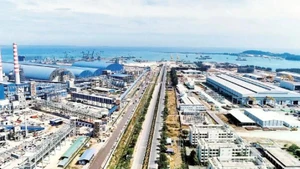A breakthrough in management mindset
In line with Resolution No. 66-NQ/TW of the Politburo on reforming law-making and enforcement to meet national development requirements in the new era, numerous legal documents, particularly laws and decrees, are being revised and prepared for submission to the National Assembly and the Government.
At the seminar “Updates on legal and policy frameworks for investment and business” organised by the Viet Nam Association of Foreign-Invested Enterprises (VAFIE), National Assembly deputy Phan Duc Hieu, member of the Economic and Financial Committee, noted that the 9th session of the 15th National Assembly had made several significant decisions on investment, production, and business.
These included bold measures to remove institutional bottlenecks, improve the legal framework, and enhance the effectiveness of law enforcement, The reforms focus on cutting and simplifying administrative procedures and business regulations to facilitate operations and reduce costs for citizens and enterprises.
Economic growth promotion, business support, macroeconomic stability, inflation control, and maintaining major economic balances remain top priorities. The Government is determined to abandon the mindset of banning what cannot be managed, while accelerating decentralisation and delegation to remove bottlenecks and unleash resources. Administrative reform is to move towards a more enabling and less restrictive regulatory environment.
Hieu emphasised that the draft law embodies the Government’s reform spirit — determined to abolish outdated, restrictive approaches and promote a more open, business-friendly legal framework. Understanding these upcoming legal changes, he added, is crucial for enterprises to ensure compliance while taking advantage of institutional reforms for growth.
Strengthening decentralisation and delegation
Outlining the key reform points designed to ensure a level playing field for both domestic and foreign investors, Hoang Manh Phuong, Deputy Director of the Legal Department at the Ministry of Finance, said the draft law simplifies administrative procedures by removing 20 conditional business sectors, including accounting services, tax procedure services, rice export, temporary import and re-export of frozen food, and the trading activities of foreign service providers in Viet Nam.
“These sectors do not meet the criteria for conditional business investment as stipulated in Article 7 of the Law on Investment and can be shifted from pre-check to post-check management, thus ensuring business freedom,” Phuong explained.
The draft law also promotes greater autonomy through decentralisation and delegation in investment decision-making. Under Articles 27 and 28, only the Prime Minister and provincial chairpersons will have the authority to approve investment policies. Projects currently under the National Assembly’s authority will be delegated to the Prime Minister to speed up processing. For special projects requiring specific mechanisms not yet covered by law, the Prime Minister will seek approval from the National Assembly Standing Committee before granting approval.
The Ministry of Finance is reviewing the draft’s consistency with other laws, including the Law on Railways and the Law on Electricity, to ensure a coherent legal framework.
The draft Law on Business Investment also narrows the scope of projects requiring policy approval, limiting it to those with significant or potentially serious environmental impacts, projects affecting national defence and security, and those in critical sectors such as seaports and airports (Articles 26 and 28).
Together, these adjustments aim to simplify investment procedures, reduce compliance costs, and foster a more transparent and competitive business environment.
















